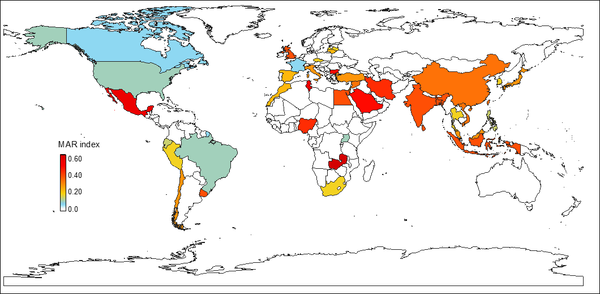
News
Research
Antibiotic use in fish farms poses human threat: study
May 6, 2020 By Nestor Arellano
 This map shows high antimicrobial resistance indexes for 40 countries that account for 93% of global aquacultural production. (© Miriam Reverter et al., Nature Communications)
This map shows high antimicrobial resistance indexes for 40 countries that account for 93% of global aquacultural production. (© Miriam Reverter et al., Nature Communications) Massive and inappropriate use of antibiotics to treat or prevent disease in farmed fish fosters the development of resistant bacteria that have the potential of harming humans. This was the finding of a recent study conducted by researchers from France’s Institute of Development and Research (IRD) and Center for International Cooperation in Agronomic Research for Development (CIRAD).
The study also showed that antimicrobial resistance is already a reality in several countries that are highly vulnerable to climate change, according to a press release from CIRAD.
“Resistant bacteria in aquaculture can either spread or transmit their resistance genes to non-resistant bacteria that infect humans, thus causing diseases that are difficult to treat in both animals and humans,” said Samira Sarter, a microbiologist with CIRAD.
Bacteria resistant to antibiotics have been found to be responsible for some 700,000 deaths each year worldwide, according to a report from the Review on Antimicrobial Resistance.
These health risks linked to antibiotic use are not restricted to aquaculture. They also apply to terrestrial farms, according to CIRAD.
“Some 60 per cent of the infectious diseases that currently affect humans are of animal origin. If a resistant bacterium or its genes were to be transmitted to humans, and existing antibiotics were ineffective, we could face a steep rise in mortality rates as a result of antimicrobial resistance,” Sarter said.
The researchers from IRD and CIRAD belonging to the Institute of Evolution Sciences of Montpellier’s Fish Diversity and Aquaculture team (DIVA, UMR ISEM) examined data from more than 400 scientific articles referring to over 10,000 bacteria of aquaculture origin from 40 countries.
A meta-analysis allowed the researchers to study the effect of temperature on the mortality rate of aquatic animals infected with pathogenic bacteria commonly found in aquaculture.
The researchers then conducted a systematic review on the abundance of resistant bacteria found on fish farms and calculated the Multi-Antibiotic Resistance (MAR) index for 40 countries.
They found high antimicrobial resistance indexes for 40 countries that account for 93 per cent of global aquaculture production.
Global warming links
The study also linked global warming to antimicrobial resistance.
“Our results show that global warming promotes the development of pathogenic bacteria, hence disease development on fish farms,” said Rodolphe Gozlan, an IRD specialist in biodiversity-health relations.
Aquatic bacteria are temperature-sensitive, according to Miriam Reverter, a post-doctoral student at IRD,
“Global warming will therefore push up mortality rates on fish farms, which is likely to mean increased antibiotic use,” Reverter said.
Use of antibiotic alternatives urged
The researchers strongly recommended that aquaculture operators adopt alternatives to antibiotics in treating and preventing fish disease.
“We urgently need to help producers in the global South find alternatives to treat and prevent disease on fish farms,” said Gozlan. “This means encouraging research that makes use of the One Health or EcoHealth approaches, i.e. that is multi-disciplinary and multi-sector.“
For instance, certain plants are highly effective for boosting disease immunity in fish. Their use on fish farms could help reduce antibiotic use, Gozlan said.
Researchers are also developing more resilient aquaculture systems based on the principles of agroecology, in the aim of reducing disease rates. Agroecology is the study of ecological processes applied to agricultural production systems.
Print this page